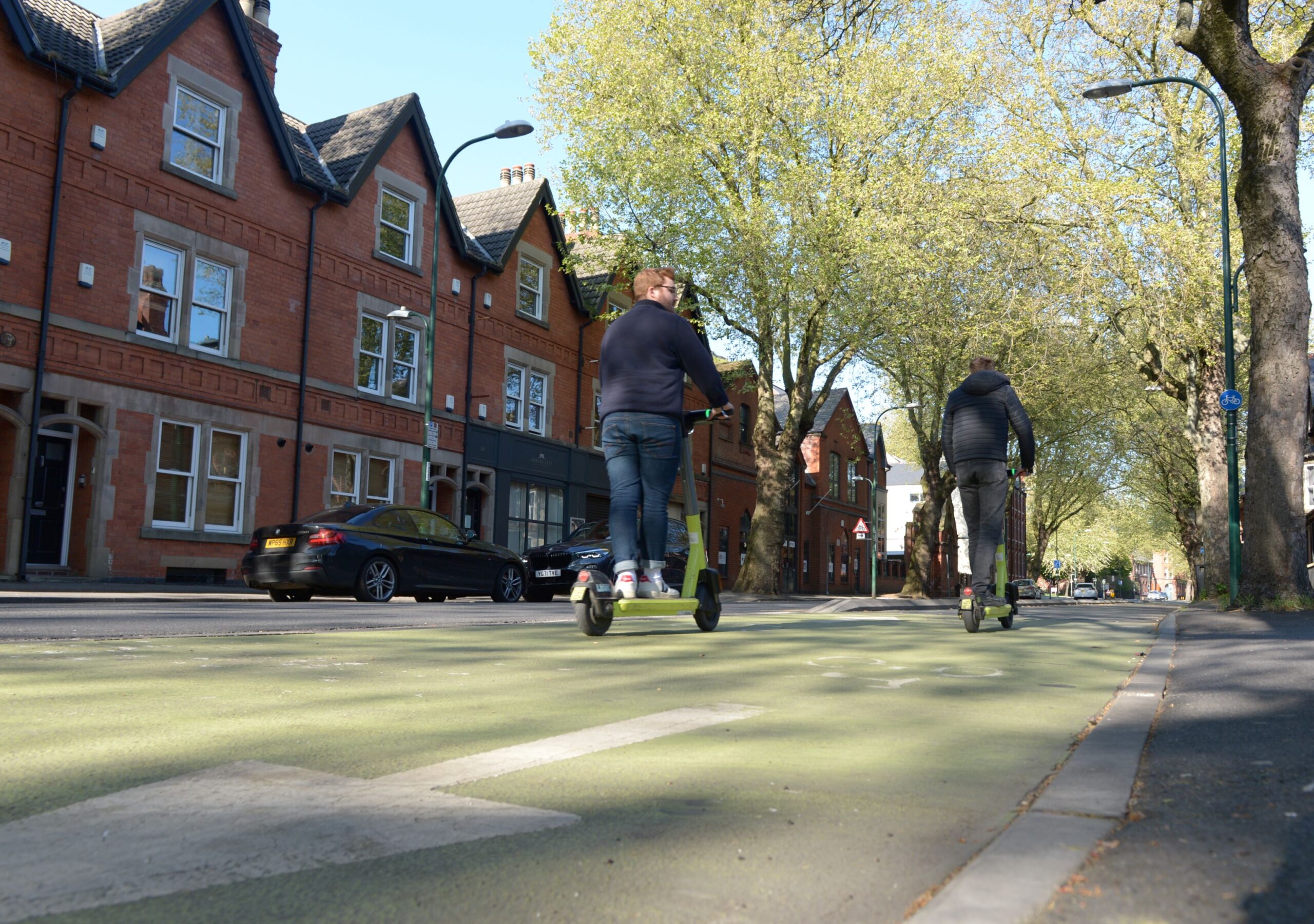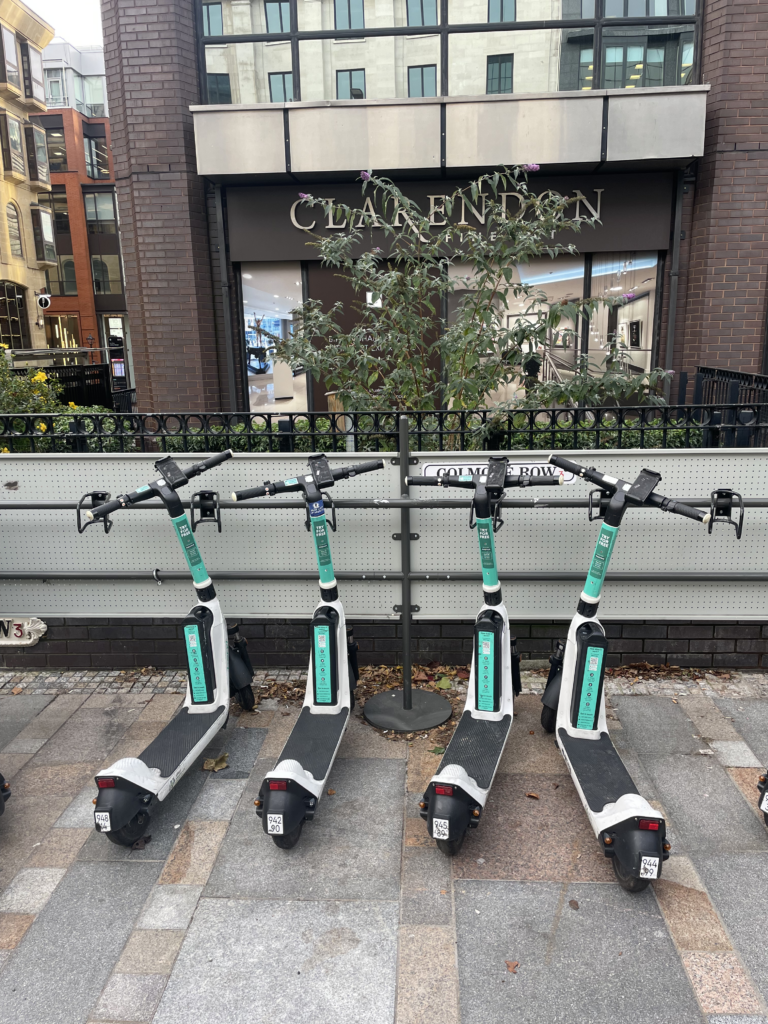Tuesday 11 February 2025
By Lauren Baker
Co(l)laboratory PhD Candidate

Photo credit: Anthony Hopwood
Nottingham’s micromobility journey
In recent years the streets of Nottingham have played host to an influx of small and colourful electric vehicles in the form of rental e-scooters and e-bikes, often referred to as ‘micromobility’. Nottingham’s micromobility journey started with the appearance of e-scooters in 2020, the city having been selected to take part in a national Department for Transport trial. Providing a distraction from pandemic woes, e-scooters quickly became the talk of the town and continued to provoke strong feelings until operating company changes caused their temporary removal in late 2023. Rental e-bikes were the next addition, making their first appearance in April 2023. Since then the service has grown; the number of e-bike rides which have taken place in Nottingham stands at 400,000, and the expanded fleet of 750 bikes can be used city-wide. You can learn more about rental e-bikes on the Transport Nottingham webpage. Occupying a space which not that long ago was solely the realm of the ‘traditional’ bicycle, rental e-bikes, and formerly e-scooters, have established a conspicuous and at times controversial presence.
E-scooter and e-bike rental has not been problem free. The sight of micromobility vehicles ‘parked’ in a careless manner will be familiar to many. Rule breaking pavement riding, alongside general irresponsible rider behaviour and associated crashes has also been a topic of concern, one frequently covered in the media. On the flip side, advocates for micromobility highlight numerous benefits for users and wider society. For some, micromobility offers a fun, affordable and convenient way to get around. The rental aspect means that purchase costs, repair costs and storage requirements are not the responsibility of the rider, overcoming some of the barriers to traditional cycling. If e-bikes and e-scooters encourage a significant number of people away from their cars we can anticipate reduced carbon emissions from transport, better air quality, and reduced congestion.

Polarised positions or a neutral majority
In light of this contrast of problems and potential, it seems worth asking, what do people in Nottingham actually think about these new forms transport? 2025 has brought exciting news for micromobility fans, Nottingham City Council having announced a new partnership with the company Dott and confirmed that e-scooters will be available again very soon. Full details of the new programme can be found online. Given the imminent ‘grand return’ of e-scooters, an investigation into resident’s views feels timely.
At present, it is not clear where public opinion lies. Attention grabbing and negative media coverage surely plays a role in shaping and reflecting popular sentiment, but this is unlikely to be the whole story. The Nottingham e-bike and e-scooter rental schemes have been reported as some of the best used in the country, suggesting there will be a significant number of micromobility fans in the city. A follow up line of enquiry is whether Nottingham is starkly divided into for and against micromobility camps. Or, is there in fact a neutral or ambivalent majority, who appreciate both the pros and cons of these modes of transport. We could also ask, who thinks what? Previous research suggests age is consequential for both micromobility usage and opinion, but what are the other characteristics along which viewpoints diverge. The first part of my PhD research aims to take a dive into these questions.
Get involved in the research
I am kicking off my Co(l)laboratory project with a Nottingham wide survey aiming to understand what people think about rental e-scooters and e-bikes. My intention is to provide a more nuanced understanding than simply recording percentages in favour of or opposed to micromobility. The research will draw on recent academic developments detailing transport stereotypes, as the different components of stereotypes allow for appreciation of the ambivalence which is often present in thinking about micromobility. The survey can be completed by visiting this webpage and, this is where you come in! Any adult who lives, works, or studies in Nottingham is eligible to take part. Survey results will be shared with the project’s Community Partner – Nottingham City Council. As the Council re-introduce e-scooters to the city your views can provide valuable insight for this process.
My closing request, please take part in my research by completing the survey. While you’re at it, ask a friend to do it too! If you have a wider audience or access to channels where you can share the survey, fantastic, promotional resources to help with this are available on request.
Lauren Baker is a Co(l)laboratory PhD candidate.
- You can contact Lauren at Lauren.Baker2023@my.ntu.ac.uk
- Learn more about Lauren through our Research Profiles
- Learn more about Lauren’s research here on their research project page
